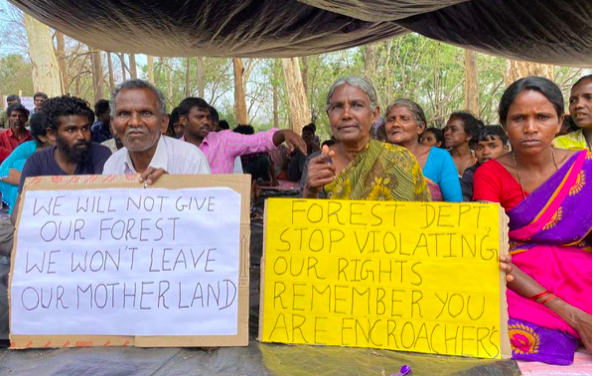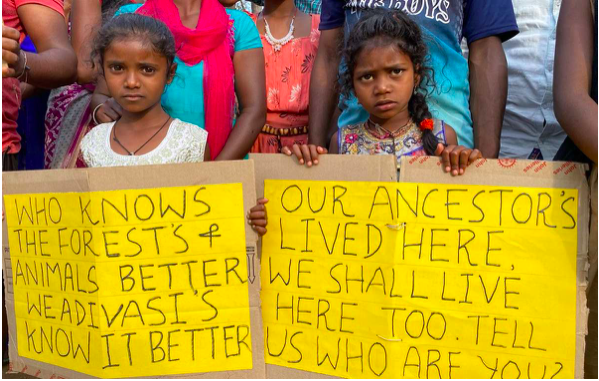Over 6,000 Jenu Kuruba Adivasis in Karnataka Begin Indefinite Protests against Tiger reserve

More than 6,000 Jenu Kuruba Adivasis have been mounting a strong resistance against the Nagarhole Tiger reserve in Karnataka. The indefinite protest started on March 17 outside the forest ranger’s office in the reserve spanning around 600 kilometres.
The community has accused the state government and the forest department alongside the Wildlife Conservation Society of trying to forcefully evict them from the forest in a bid to pave way for eco-tourism activities while trampling on the Adivasis’ rights to the forest and land.
IN THE NAME OF TIGER CONSERVATION
The struggle for land rights by the traditional honey collecting community has been going on since the 1970’s and has gained renewed momentum after the push for eco-tourism activities in the reserve and the ongoing attempts to evict the community.
JK Thimma, the priest of the Jenu Kuruba tribe, explained, “The protests have been taking place across different ranges. The state government, the central government and its agency the NTCA ( The National Tiger Conservation Authority) have been pushing the community out of their land to enable the creation of eco-tourism whose main purpose is to mint money and generate profit for themselves.” Thimma further highlighted denial of land rights to the community, saying, “Our community has fought for individual land rights, community rights and also habitat rights but our claims have remained rejected. Over 4,000 claims for land rights have been filed but no one has received their rights to land. Those who managed to gather individual land rights are further not allowed to expand their houses or cultivate the land.”

The Jenu Kuruba community have been a traditional honey gathering tribe, but it also depends enormously on cultivation and forest gathering for livelihood.
The community has alleged that the Karnataka forest department has obstructed these activities and also filed cases against Adivasis. Moreover, they said that the livelihood and the identity of the community was at stake as under the garb of tiger conservation the community was being driven out of the forest.
Thimma added, “The state forest department and the central government are hands in glove in pushing this narrative; this non-existent narrative is one way of pushing the community to leave the land. We are even being stopped from accessing our own land.”
Accusing the state wildlife board, the state forest department and the NTCA of violating the rights of the community, Thimma said, “Section 5 (b) of the Forest Rights Act gives power to the gram sabhas to decide on what to do with their land. However, there are forest bungalows, camp offices and roads being constructed with the community being forced to leave; here, the forest department is an encroacher, promoting eco-tourism and safaris.”
EVICTIONS AND ‘VOLUNTARY RELOCATION’
The struggle of Adivasis for land rights is not new. Starting from the 1970s and continuing till today, many of the Jenu Kurubas have been evicted from their homes due to conservation measures in the various tiger reserves of the Nilgiris, such as Nagarhole and Bandipur. Many of those who have been earlier forced out of their land are also standing in solidarity with the ongoing protests.
More than 800 people have currently filed their claims to return to their forest. JA Shivu, one of the members of the community speaking to NewsClick explained, “Those who were evicted had to work as daily wagers and bonded labour in many of the plantations, losing connection with their land, culture and language. Those who were evicted are now fighting a battle to come back to their land, they are also a big part of this movement, over 800 people have been fighting for their right to return to their land under the Forest Rights Act.”
Other tribal communities across India have also been fighting the narrative of tiger conservation versus tribals in a bid to continue to stay in the forests. Speaking to NewsClick, Sohpie Grig, researcher with Survival International, which is currently running a campaign against these forced evictions, explained, “Organisations like the Wildlife Conservation Society (WCS) list facilitating the government's relocation scheme as their first conservation activity on their website and run an annual training programme for forest officials in ‘voluntary relocations.’ Although these government relocations are described as voluntary, in all the cases of relocation that Survival International has investigated, Adivasis report that the Forest Department waged a campaign of harassment and threats against them so great that finally, exhausted, they “agreed” to move, meaning that the evictions were both forced and illegal. Recently evicted Jenu Kurubas have described this as ‘a kind of torture.’” Shivu added, “Evicting Adivasis from their ancestral lands is not only devastating to them, it is counter-productive for conservation and is illegal under Indian and international laws.”
NewsClick reached out to WCS for comments, but has not received any response. The story will be updated as and when a response is received
Get the latest reports & analysis with people's perspective on Protests, movements & deep analytical videos, discussions of the current affairs in your Telegram app. Subscribe to NewsClick's Telegram channel & get Real-Time updates on stories, as they get published on our website.
























